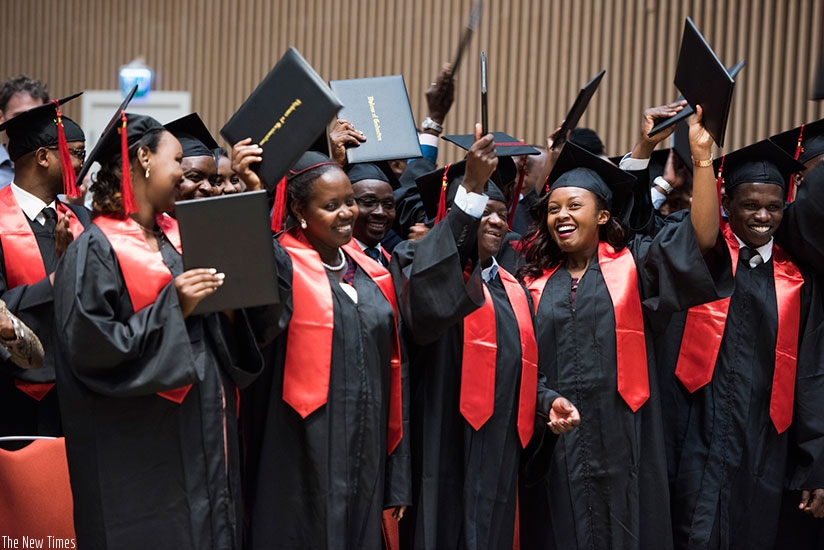President Paul Kagame thanked the University of Global Health Equity (UGHE) and Partners in Health for its role in advancing global health delivery by training the next generation of global health care professionals.


President Paul Kagame thanked the University of Global Health Equity (UGHE) and Partners in Health for its role in advancing global health delivery by training the next generation of global health care professionals.
"The UGHE is premised on the insight that national health systems can’t be bypassed. Hence the focus on strengthening capacities using the resources we have. So, our country’s ambition and vision have come together very nicely with the strength of the partnership and knowledge Partners in Health and the whole team around UGHE have been able to bring in our country,” he said.
"The progress Rwanda has registered in the last decade comes largely from empowering citizens,” Kagame added.
The Head of State, who was accompanied by First Lady Jeannette Kagame, delivered the message at the university’s graduation ceremony for the 24 students who earned a Master of Science degree in Global Health Delivery (MGHD).
Launched in 2015, UGHE is an international health sciences university in Rwanda that is training the next generation of leaders in health care through a new emphasis on the science and practice of health care delivery.
Owned and operated by Partners in Health, a global non-profit health care organisation, UGHE is a private, accredited institution leveraging expertise and resources from the Government of Rwanda, Harvard Medical School, and other key partners to create a global forum for delivery-focused teaching, research, clinical care, and implementation.
The two-year, part-time Master of Science in Global Health Delivery (MGHD) is UGHE’s flagship academic programme. Modelled after a similar programme at Harvard Medical School, the MGHD provides one-of-a-kind learning experiences deeply rooted in the principles of global health, One Health, epidemiology, global health policy, management, finance, and leadership.
The 24 graduates include practising medical doctors, nurses, pharmacists, professional researchers, agronomists, and veterinarians.
As the university grows, more clinical degree programmes in medicine, nursing, and oral health, as well as non-clinical programmes in research and health management will be added. All the clinical degrees will be joint programmes that include the Master of Science in Global Health Delivery, the university said.
Benjamin Ndayambaje, who spoke on behalf of graduates, said that the programme completed at the college has exposed them to the best programmes across the world.
"As transformative health leaders, we are ready to change the world,” he said.
During their course, Ndayambaje said, they appreciated the challenges in health delivery that face the world today and learned about team spirit and working together to achieve results.
"Although we celebrate today the work is not yet over. Let’s go out, roll up our sleeves, and fight for health equity wherever we go,” he said, urging fellow graduates to be agents of change wherever they will go after the graduation.
Dr Paul Farmer, Co-founder and Chief Strategist of Partners in Health, told the graduates that they now have a responsibility to be leaders in the delivery of health care in Rwanda and around the world.
"We are counting on you to lead,” he told them.
President Kagame said that the UGHE will not only be the centre to provide global health equity but also a space of excellence in the promotion of global health delivery.
The President pledged that the Government of Rwanda will continue to support the University of Global Health Equity in its ambition to advance global health delivery by training the next generation of global health care professionals.
"You can be assured of our continued support as this institution grows as a centre of excellence in our country and our region,” President Kagame told the university’s faculty and graduates at the event.
He added that the progress Rwanda has achieved in the last decade comes from empowering citizens and that Rwandans will continue to be mobilised and educated.
The university has begun construction of its first permanent campus in Butaro, northern Rwanda, where modern classrooms, teaching laboratories, a clinical simulation centre, and information commons, as well as administrative dining and lodging facilities will be hosted to support over 1000 students and faculty.
In the future, a second campus will be added in Masaka, Kigali, providing students with further access to a broad set of clinical disciplines, in both rural and urban settings. By 2025, the UGHE has a vision to be a convening space for the world’s best thinkers and innovators in health care.
editorial@newtimes.co.rw


